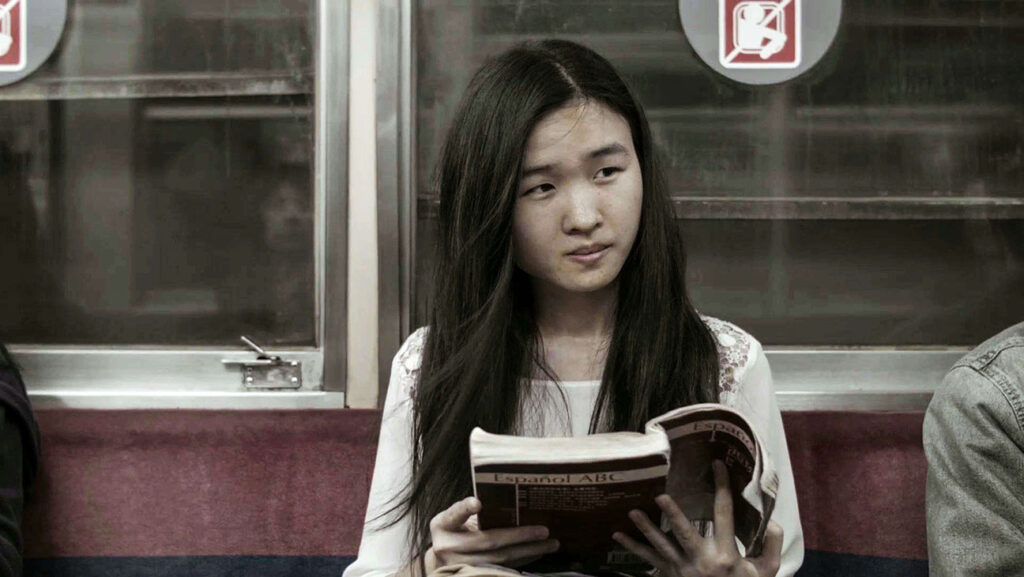You might be off-put by the relative flat acting in director Nele Wohlatz’s “The Future Perfect” (original title “El futuro perfecto”), but if you stick it out until the end, it all begins to make sense—particularly if you’ve ever taken a foreign language class. Set in present-day Argentina, the movie, which won the New Auteurs Grand Jury Award at AFI FEST 2016, is about a young Chinese woman acclimating to her new life in Buenos Aires.
Xiaobin (Xiaobin Zhang) has just rejoined her family in Argentina. Her family owns a laundromat (lavanteria), but Xiaobin’s mother wants her to repay her family for the cost of her flight over so she is immediately put to work at an uncle’s grocery store behind the deli counter. Xiaobin cannot, however, speak or understand Spanish.
Fired from her first job, she immediately gets another one, but also starts taking Spanish classes on the sly. All of the students look East Asian which makes sense since the instruction is likely in Mandarin.
For those who aren’t up on their grammatical terms, the title refers to a tense in which an action that takes place in the future has been completed. Perfect, in this respect, means completed. In English, this is expressed in two ways. First, by using “will have” done something and second by using “be going to have ” done something. For example, “By the end of the week, I will have eaten all the leftovers” or “By the end of the week, I am going to have eaten all the leftovers.”
The English title also refers to what might be the perfect future of Xiaobin as well as the differences between Chinese and Spanish. Mandarin Chinese is not a language rich in tenses or other verb conjugations. Chinese verbs do not require conjugations for first, second or third person, singular or plural. Yet the language’s complexity lies in its tones, written form and vocabulary. How simple and yet imprecise Spanish must seem to speakers of Mandarin Chinese as words for sister and brother do not specify if the sibling is older or younger or the exact relationship of the uncle or aunt.
Xiaobin is part of a tradition, in some ways more Chinese than her siblings, but she also begins to see the possibilities and options that Argentina might hold for her future, outside of her Chinese community.
At her new workplace, Xiaobin meets another immigrant, Asian Indian Vijay (Saroj Kumar Malik). They communicate with each other in Spanish. Yet some of the situations take a surreal turn as they mimic the language class situational skits. Vijay wants to marry Xiaobin and return to India.
Xiaobin’s family has other ideas. Xiaobin hasn’t told them about Vijay, lying when she returns late after seeing a movie with him. Xiaobin’s family want to introduce her to another Chinese immigrant. At 18, Xiaobin thinks that she is too young for marriage. At a moment that should seem deeply personal, Xiaobin isolates herself from Vijay by speaking Mandarin Chinese.
It isn’t clear if Vijay understands any Mandarin. Yet the movie also shows a non-Asian ethnic actor who speaks many languages, including Mandarin Chinese, as if to suggest there are other possibilities for Xiaobin, beyond Vijay and the Chinese suitor.
“The Future Perfect” premiered in Switzerland in August of this year at the Locarno Film Festival. It made its North American premiere at AFI FEST and will make its South American premiere in Argentina on November 25. Written by Pío Longo and Wohlatz, “The Future Perfect” is Wohlatz’s first fictional feature length movie. Wohlatz previously co-directed the 2013 documentary, “Ricardo Bar.” “The Future Perfect” is in Spanish and Mandarin Chinese with English subtitles.












